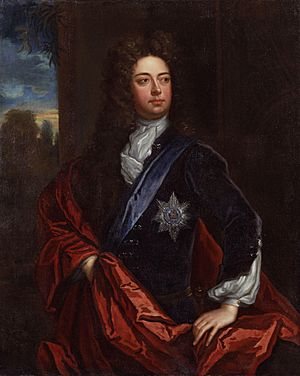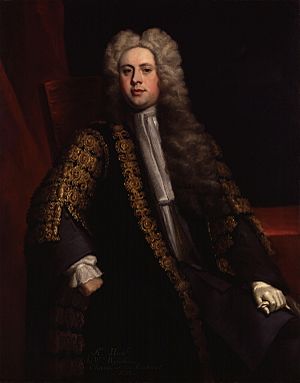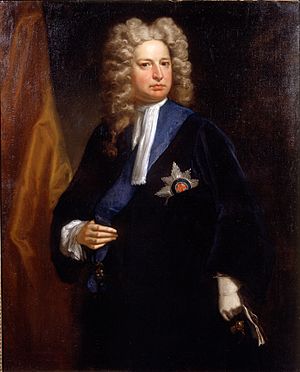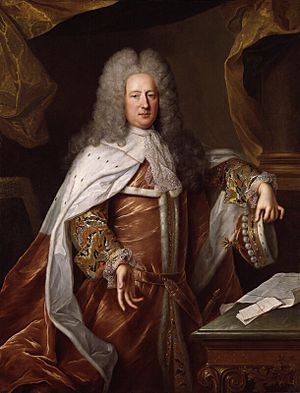Harley ministry facts for kids


The Harley ministry was the government of Great Britain between 1710 and 1714. It happened during the rule of Queen Anne. This government was led by Robert Harley. Most of its members were from the Tory political party.
Harley used to be a Whig but changed sides. He helped to remove the powerful Whig government that was in charge before. This time was known as the "Rage of Party." It was a period when the two main political groups, the Whigs and the Tories, had very strong disagreements. Many writers supported Harley's government, like Jonathan Swift and Daniel Defoe. They often argued with writers who supported the Whigs.
Contents
Ending the War: The Peace Treaty
The Harley government worked hard to end the War of the Spanish Succession. This war had been going on for a long time. Their efforts led to the signing of the Treaty of Utrecht. Viscount Bolingbroke was in charge of most of the foreign affairs.
The Whig party strongly opposed the peace treaty. They used the slogan No Peace Without Spain, meaning they wanted the war to continue until Spain was fully defeated. To get the peace treaty approved, Harley needed more support in the House of Lords. This part of Parliament was mostly controlled by the Whigs. So, Harley created twelve new noble titles in one day. These new nobles, known as Harley's Dozen, were all Tories. This helped to get the treaty passed.
The government also took action against Sir Robert Walpole, a Whig politician. They accused him of making too much money from the war. He was sent to the Tower of London for a short time.
Changes in Military Leadership
In December 1711, the government made a big change. They removed Lord Marlborough from his role as the top military commander, called Captain General. Marlborough was a very successful general, but he was supported by the Whigs. The government replaced him with the Duke of Ormonde, a strong Tory general.
Ormonde led the British forces in Flanders in 1712. However, he received secret orders from Harley. These orders told him not to let his troops fight the French. Ormonde then marched his soldiers away from the other allied forces, who were led by Eugene of Savoy. Without the British help, the allies suffered a major loss at the Battle of Denain.
Marlborough also lost his government job as Master General of the Ordnance. This position was given to the Duke of Hamilton, a Scottish Tory. Hamilton was also chosen to be the first British Ambassador to France after the war. But before he could go to France, he was killed in a famous duel in Hyde Park. His opponent was a Whig politician named Lord Mohun.
The Government's End and What Happened Next
The Harley government ended when Queen Anne died in 1714. The new king, George I, did not trust Harley or Bolingbroke. He thought they had opposed his family, the House of Hanover, becoming the next rulers. He believed they supported the Jacobites, who wanted a different king.
So, the Harley government was replaced by the Townshend ministry. This marked the start of the Whig Ascendancy, a long period when the Whig party was in power. It would be almost fifty years before a Tory government was in charge again.
After the government fell, Bolingbroke had to leave the country. Many of his supporters also went into exile. Harley was accused of serious crimes by Parliament. He stayed in the Tower of London until 1717. Matthew Prior, who helped with the Utrecht treaty, was also put in prison.
Some former members of the government were involved in the 1715 Jacobite rebellion. This was an attempt to put a Jacobite king on the throne. Bolingbroke, while in Paris, worked for the Jacobite claimant, James III. The Earl of Mar, who had been a Scottish minister, led the uprising in Scotland. Sir William Wyndham was arrested because he was seen as a possible leader of the revolt in England.
Key Government Leaders
This table shows some of the main people who served in the Harley government and their roles.
See also
| Preceded by Godolphin–Marlborough ministry |
Government of Great Britain 1710–1714 |
Succeeded by Townshend ministry |
 | Jackie Robinson |
 | Jack Johnson |
 | Althea Gibson |
 | Arthur Ashe |
 | Muhammad Ali |



